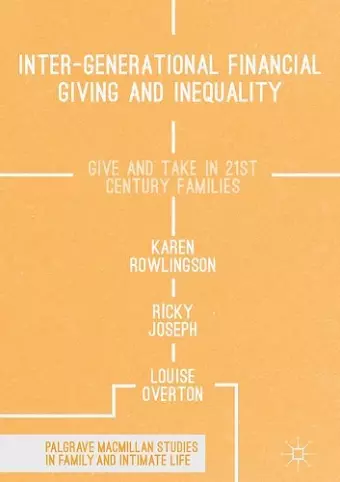Inter-generational Financial Giving and Inequality
Give and Take in 21st Century Families
Karen Rowlingson author Ricky Joseph author Louise Overton author
Format:Hardback
Publisher:Palgrave Macmillan
Published:25th Apr '17
Currently unavailable, and unfortunately no date known when it will be back

"Aspirations of promoting 'social mobility' are high up political agendas across the spectrum, but collide with huge differences in the resources available to different families to help their children through their lives. The research presented in this book is an essential corrective to simple assumptions of how and why financial relations between different generations have been changing. By using national data and through detailed interviews with different generations of the same families, the authors shed a fascinating light on what is actually going on in contemporary Britain - and on how both sides of the so-called 'generational divide' see the needs for, but also limits to financial transfers between them." (John Hills, London School of Economics, UK ) "In recent decades, the social, economic and political balance between the young and old has become remarkably uneven across developed societies. Inter-generational equity, fairness and justice have subsequently emerged as critical concerns, redefining social policy frameworks and public spending debates. The tendency has been to emphasize conflicts of interest between lucky, asset and pension wealthy baby boomers and unfortunate, labour insecure and debt burdened millennials. This contribution goes well beyond the divisiveness of current debates to pull apart and lay bare contemporary features of family and inter-generational relations. The book overall provides critical insights on giving and taking in family relationships, as well as their impact on the wider economy, that will be invaluable for policy makers and social scientists." (Richard Ronald, University of Amsterdam, Netherlands) "This is an authoritative and accessible study of the giving and receiving of lifetime gifts, built on new and extensive empirical research. Experiences of giving gifts to family members, and the moralities that underpin this, are linked imaginatively to an analysis of the ways in which the welfare state supports different generations. The book provides an important indicator of the strength both of contemporary families, and also of the continuing attachment to tax-payer funded support for individuals." (Janet Finch, University of Manchester, UK)
Despite growing concern about intergenerational tension and even possible conflict, the book finds evidence of a significant degree of intergenerational solidarity both within families at the micro level and between generations more generally within society at the macro level in Britain.
This book makes a major contribution to our understanding of 21st century families in Britain through an exploration of intergenerational relationships. Drawing on new and extensive quantitative and qualitative research, the authors explore the giving and receiving of financial gifts. Despite growing concern about intergenerational tension and even possible conflict, the book finds evidence of a significant degree of intergenerational solidarity both within families at the micro level and between generations more generally within society at the macro level in Britain. However, given substantial inequalities within different generations as a result, in particular, of social class divisions, some families are able to support each other far more than others. This means that strong intergenerational solidarity may lead to the entrenchment of existing intragenerational inequalities.
The book will be of interest to scholars and students researching Sociology, Social Policy, Family Sociology, Generations and Intergenerational Relationships.ISBN: 9781349950461
Dimensions: unknown
Weight: 5106g
304 pages
1st ed. 2017